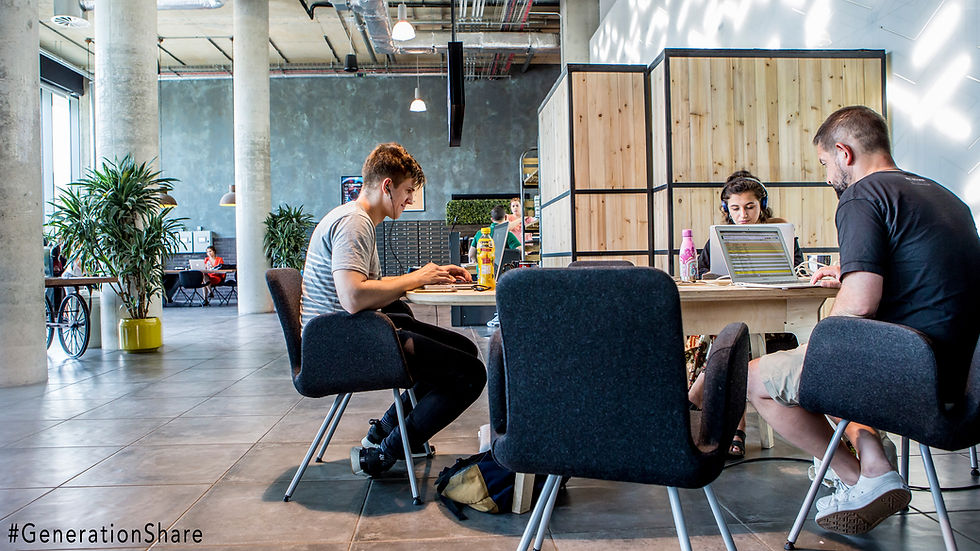Why the Sharing Economy Will Matter (to Your Life and Business) in 2018
- Benita Matofska

- Dec 14, 2017
- 4 min read

The Sharing Economy is proving to be the biggest business trend of all time and as 2017 draws to a close, we could look back on the year that saw potential valuations of this new economy soar to $2 trillion[1] and to the battles in cities across the world to adapt to new models of accessing shared resources. Instead, I’d like to look forward to what’s in store for 2018.
Others may predict mainstream adoption of AI, increased live interactions, live streaming video content (think Facebook Live plus), social learning, Blockchain adoption by big players, breakthroughs in zero emission cars, the Indian economy taking flight along with flying cars and veganism going massive…but all of these predictions have a common thread and a much bigger notion behind them. It’s called the Sharing Economy and though often misunderstood and believed to relate only to big brands such as Airbnb, Uber and Zipcar, it’s actually a broad concept that includes a variety of different types of sharing. It empowers people to create, trade, swap, access and share goods, services and resources between themselves and recognises tri-part value – economic, social and environmental; in a Sharing Economy, all are costed and counted.
Given that this is seen to be causing the biggest societal shift since the Industrial Revolution, I’d like to share 5 insights from my Sharing Economy crystal ball about what’s coming in 2018.
Future of Work: with estimates that 40% of us will be freelancers in a gig-based economy by 2020, I predict that 2018 will see gig working heading into the mainstream and a greater understanding of the opportunities this type of work represents for those excluded by traditional forms of work. We’ll also see a new classification of Sharing Economy Worker emerge and better support systems enabling Sharing Economy Workers to benefit from this type of flexible working, whilst accessing the necessary protections to ensure that they aren’t exploited. Platform cooperatives will continue to rise with models of shared ownership benefitting Sharing Economy workers.
Future of Health: with over 175,000 health apps available on the Apple store alone, 2018 will see the start of the healthcare system itself being transformed from a system fit for the 1950s, into one that helps us all become fit for future. From connecting patients directly to doctors, to peer-to-peer patient power, the healthcare system will adopt the Sharing Economy approach, combined with technology, to transform what is currently a sickcare system into one that has the interest of all our health at heart.
Future of Business: It’s estimated that there are currently 170 million social enterprises or purpose-driven businesses worldwide. Social enterprises are businesses that understand that by delivering not only profit, but benefit to society at large (sharing), they future-proof their businesses. In 2018, social enterprise and mission-driven business will start to head mainstream as businesses recognise that delivering wider value is important to their customers. The rise of the conscious consumer will continue as the crowd start to play a greater role in business creation, growth and success. Traditional businesses will look to find ways of participating in the Sharing Economy, transforming their models and ensuring their place in the future.
Future of Resources: Our growing population is expected to demand 35% more food, 40% more water and 50% more energy by 2030[2]. It’s clear, then, that the sharing of our precious resources will become even more of a necessity in 2018. Governments, organisations, businesses, individuals, families and communities will come to recognise the need to embrace the Sharing Economy in order to access the resources they need to live, work and thrive. There are over £3.5 trillion worth of unused resources worldwide[3] and more than 10,000 Sharing Economy initiatives globally providing access to those unused resources. I believe that in 2018, the number of Sharing Economy initiatives across the world will double, provide much greater, needed access to shared resources.
Future of Community: More than 50% of the world use a smartphone, 50% of us have access to the internet and 2.8 billion people (37%) are social media users[4]. Technically, we are more connected than we’ve ever been. 2018 will see online connectedness translate into offline connectedness as the internet enters its next phase – as a tool to enhance and enable real-life interactions and foster human-community bonds. Communities will benefit from greater access to shared resources and crowdsourcing.
In 2018, as the line between work and life continues to blur, what will become important is quality of life and wellbeing.
How our work and business brings value to ourselves and to others, the benefits of being part of connected communities and the ability to pursue our passions so we can live the life we want will become ever more important as the Sharing Economy takes hold in 2018 and starts to transform our lives and our future.
[1] BofAML, BIA/Kelsey, SIC: Primer on the Sharing Economy, 2017
[2] PwC Megatrends, 2017
[3] The People Who Share, 2015
[3] The People Who Share, 2015
[4] Digital in 2017 Overview, We Are Social and Hootsuite, 2017




Comments